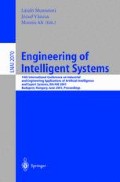Abstract
Based upon empirical studies, this paper describes a negotiation model to support materials selection by design teams using concurrent design methodologies. The model is realised in a tool that supports designers in this task. Given a list of materials currently proposed, similar alternatives are offered to individual designers based upon both shared and private representations. Fuzzy measures of similarity are used to identify possible counter proposals. A fuzzy measure of value is used to rank these. Conventional negotiation protocols from economics or game theory did not correspond well to the negotiation behaviour of designers. Currently, the human user remains responsible for the communication of any proposal he or she wishes to make, and for the supporting argumentation.
Access this chapter
Tax calculation will be finalised at checkout
Purchases are for personal use only
Preview
Unable to display preview. Download preview PDF.
References
Landauer, T. K.; The trouble with computers. Academic Press, Cambridge Ma. (1995)
Smithers, T.; On knowledge level theories of the design process. in Artificial Intelligence in Design. Gero, J. S., Sudweeks, F. (eds.) Kluwer Academic Publishers. (1996) 561–579.
Huns, M. N. and Stephens, L. M.; Multiagent Systems and Societies of Agents in Multiagent Systems: A Modern Approach to Distributed Artificial Intelligence. Weiss, G. (ed.), MIT Press. (1999) 79–120
Barker, R., Meehan, A., Tranter, I.; A Knowledge-level Model for Concurrent Design. Applied Intelligence, 10: (1999) 113–122
Barker, R., Holloway, L., Mardell, J. and Meehan, A.; Supporting Knowledge-based processes using flexible intelligent agents. AAAI Spring Symposium 2000, Stanford, Ca., USA (2000).
Bernaras, A. and Van de Velde, W.; Design. in Breuker, J., Van de Velde, W. (eds.) CommonKADS library for expertise modelling: reusable problem solving components. IOS Press, (1995) Chapter 8.
Shiva Kumar, Suresh, S., Krishnamoorthy, C. S., Fenves, S. J.. Rajeev, S.; GENCRIT: a tool for knowledge-based critiquing in engineering design. Artificial Intelligence for Engineering Design, Analysis and Manufacturing, vol. 8, Cambridge University Press, 1994.) 239–259.
Barker, R., Tranter, I. and Meehan, A.; Towards a knowledge-level model of concurrent design. In IEA-AIE’98, Proceedings of 11th International Conference on Engineering Applications of AI and Expert Systems, Mira, J, del Pobil, A. P., Moonis Ali (eds), Lecture Notes in Artificial Intelligence 1415; Springer-Verlag, (1998) 57–67.
de Hoog, R., Martil, R., Wielinga, B. et al.; The CommonKADS Model Set, ESPRIT Project P5248: Document Id. KADS-II/WP I-II/RR/UvA/018/4.0, University of Amsterdam (1992)
Barker, R. and Meehan, A.; Supporting Concurrent Design Teams with Adjustably Autonomous Agents, AAAI Spring Symposium 1999, Stanford, Ca., USA (1999)
Holloway, L.; A methodology and support tool for environmentally conscious design and manufacture. PhD Thesis, Sheffield Hallam University, Sheffield S1 1WB, UK. (1997)
Holloway, L.; Materials selection for optimal environmental impact in mechanical design. Materials & Design 19; Elsevier Science Ltd. (1998) 133–143
Wong, S. T. C.; Preference-based decision making for cooperative knowledge-based systems. ACM Trans on Information Systems, 12:4 (1994) 407–435.
Sycara, K., Lewis, C.; Modelling group decision making and negotiation in concurrent product design. International Journal of Systems Automation 1:217–238.
Ephrati, E. and Rosenschien J. S., 1996. Deriving concensus in multiagent systems. Artificial Intelligence 87 (1991) 21–74
Kraus, S. Sycara, K., Evenchick, A.; Reaching agreement through argumentation: a logical model and implementation. Artificial Intelligence 104 (1998) 1–69.
Zlotkin, G., Rosenschein, J. S.; Mechanisms for automated negotiation in state oriented domains. Journal of Artificial Intelligence Research 5 (1996) 163–238.
Zlotkin, G., Rosenschein, J. S.; Mechanism design for automated negotiation and its application to task oriented domains. Artificial Intelligence 86 (1996) 195–244.
Faratin, P., Sierra, C., Jennings, N. R.; Negotiation Decision Functions for Autonomous Agents. Int. J. of Robotics and Autonomous Systems 24 (3-4) (1997) 159–182.
Valverde, L.; On the structure of F-indistinguishability. Fuzzy Sets and Systems 17 (1985) 313–328 (cited in Sierra, et al 1999).
Sierra, C., Faratin, P. and Jennings, N. R.; Deliberative Automated Negotiators Using Fuzzy Similarities. Proc EUSFLAT-ESTYLF Joint Conference on Fuzzy Logic, Palma de Mallorca, Spain, (1997) 155–158
Author information
Authors and Affiliations
Editor information
Editors and Affiliations
Rights and permissions
Copyright information
© 2001 Springer-Verlag Berlin Heidelberg
About this paper
Cite this paper
Barker, R., Holloway, L., Meehan, A. (2001). A Negotiation Model to Support Material Selection in Concurrent Design. In: Monostori, L., Váncza, J., Ali, M. (eds) Engineering of Intelligent Systems. IEA/AIE 2001. Lecture Notes in Computer Science(), vol 2070. Springer, Berlin, Heidelberg. https://doi.org/10.1007/3-540-45517-5_77
Download citation
DOI: https://doi.org/10.1007/3-540-45517-5_77
Published:
Publisher Name: Springer, Berlin, Heidelberg
Print ISBN: 978-3-540-42219-8
Online ISBN: 978-3-540-45517-2
eBook Packages: Springer Book Archive

